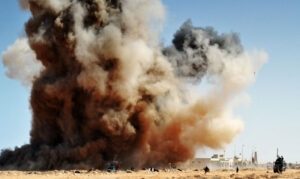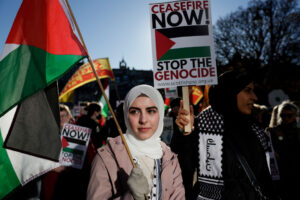Over the last fortnight, everything has changed in Lebanon. Hezbollah, which had dominated the country’s politics for more than 20 years, has seen its leadership decapitated, its arsenal diminished, its anti-Zionist credentials tarnished. All the while, its civilian base, huddled among the dense, majority-Shi’a cityscapes of South Beirut, the rolling hills of southern Lebanon, and the farmlands of the Beqaa, has borne the brunt of Israel’s assault. Hassan Nasrallah, the group’s leader, a man who’d formerly enjoyed cult status across the Arab world, is dead. Hashem Safieddine, Nasrallah’s presumed successor, is likely gone as well.
Hezbollah is far from finished. It has continued to fire hundreds of rockets, and at times even ballistic missiles, towards Israel on a daily basis over recent weeks. In Lebanon’s south, its guerrilla forces have reportedly repelled Israeli advances, claiming to have killed dozens of troops and destroyed multiple Israeli Merkava tanks. And if Hamas has been able to endure a year of war with Israel in the tiny Gaza Strip, the expansive Shi’a militia will surely endure too.
Yet whether the war in the north persists for weeks, months, or longer, it’s already clear that Lebanon’s old political order is dead and buried. As its fierce resistance to the IDF implies, this is less about Hezbollah’s military capabilities — and more because of politics. With the group humbled by Israel, Lebanon’s powerbrokers are finally poised to nudge the militants from their prized place at the top of the country’s political hierarchy. That, in turn, will leave space for the group’s allies and rivals to scrap for influence, both in Lebanon itself and across the region. As disastrous as the status quo has been for the Lebanese people, in short, whatever happens next will surely rival the worst crises of the country’s modern history.
The essential problem here is how Lebanon works. It may in theory be a democratic republic, but in practice the country’s politics is a tangle of feudal, sectarian fiefs, each ruled by an oligarchy of former warlords operating though political parties. Woven into this complex tapestry are threads of foreign influence. From Syria to Israel to Iran, they’ve each prodded Lebanon in varied directions since the latter’s independence from France in 1943. No wonder the formal state has become little more than a way for domestic leaders and their foreign backers to enrich themselves at the expense of the Lebanese people.
This reality is unlikely to change after the current war. But it also means that, unlike in Gaza, Hezbollah and its Iranian masters aren’t the only game in town. Certainly, Lebanon’s elite are keenly aware of this. Having for years been forced to watch their country be abused by Hezbollah and Iran, the prospect of winning back some degree of independence is surely enticing.
That’s especially true given that Hezbollah have been making themselves unpopular for years. Consider, for instance, their support of Bashar al-Assad in the Syrian Civil War. Apart from alienating Lebanese Sunnis, who loathed the Syrian army’s extermination of their coreligionists in Aleppo and Homs, many Lebanese Shi’a couldn’t understand the relationship between Assad’s brutality and Hezbollah’s claims to be fighting for a free Palestine.
In more recent years, moreover, Hezbollah increasingly became bound up within the Lebanese state itself. That meant it was forced to act as a guarantor of the country’s corrupt order, even as people from across the religious spectrum rose up in protest after the financial collapse of 2019. Many Lebanese, especially Christians, also blamed the group for the catastrophic 2020 Beirut port blast, hardly unsurprising given Hezbollah essentially shut down efforts to investigate it.
Though Hezbollah’s level of support among Lebanese Shi’a remains high, and is perhaps more robust than ever right now, it’s now far less popular among other denominations. At the height of the 2006 war, after all, the group was lionised across the Middle East for its stout defence against Israel, with its support among Christians, Druze and Sunnis ranging from 80-89%. These days, almost exactly 18 years later, polls show that their non-Shi’a support had collapsed to just 10%, with more than half of Lebanese stating they had no trust in Hezbollah at all.
Given all this, the arrival of full-scale war between Israel and Hezbollah was the last straw for many Lebanese — and their political representatives. Without a sitting president since 2022, and with a mere caretaker as prime minister, the main representative of the Lebanese state has long been Nabih Berri. A career politician and long-time parliamentary speaker, he’s for decades served as Lebanon’s political kingmaker. And though he’s long tied his political prospects to Hezbollah, in the last few days Berri has signalled that he may sidestep Hezbollah’s preferred presidential candidate in favour of a consensus-minded alternative. The Biden Administration has reportedly backed this proposal too, even as it prods the Lebanese elite to pick a new president before any ceasefire with Israel is signed.
The election of a president without Hezbollah’s blessing — and indeed one backed by the White House — would be a major departure from the tenure of former president Michel Aoun. Serving from 2016 to 2022, he proved a reliable Hezbollah ally. More fundamentally, though, the relegation of Hezbollah’s voice within Lebanon’s bewildering political chorus could have broader implications too. Within the country’s sectarian parliamentary system, it may signal that Berri and his Amal Movement seek to grab more influence among Lebanon’s Shi’a.
Other political factions could be quick to pounce too. One example is the Lebanese Forces, the country’s largest Christian party, which has long opposed Hezbollah. They’ve already spoken out against Hezbollah, Iran, and the current war, and may ultimately seek to absorb burgeoning discontent among Lebanese Christians toward Hezbollah — and in doing so may try to gain leverage over their confessional rivals, namely Michel Aoun and his Hezbollah-aligned Christian party. Lebanon’s Sunni leaders, who’ve struggled to make their voices heard amid Hezbollah’s dominance, could also feel reinvigorated to pursue their interests — especially if Saudi Arabia and other Gulf States decide to reinvest in Lebanon now that Hezbollah is weaker.
Naïve observers may be inclined to see this political merry-go-round, and Hezbollah’s potential weakening within it, as a sign that Lebanon’s prospects could improve. But even if you ignore the country’s mountain of social and economic problems, a humbled Hezbollah would hardly slink off without a fight. We’ve seen exactly what the group is capable of when it feels threatened. On two occasions, in 2008 and 2021, it deployed fighters to the streets of Beirut, clashing with other militias as well as the Lebanese army proper.
That’s hardly surprising: vastly more powerful than the nation’s official soldiers, Hezbollah is used to throwing its weight around. Just as important, the destruction of some of its arsenal may delude Hezbollah’s enemies into believing the group is primed for annihilation. That would be a mistake — and anyway, without the deterrent of the group’s missiles and armoured vehicles, the risk of bloodshed between Lebanon’s various militias becomes ever higher. To put it bluntly, then, the end of the conflict with Israel may yet return civil war to Lebanon itself.
As so often, though, what happens to Lebanon is ultimately for outsiders to decide. Crucially, Hezbollah has never acted independently, and as the region takes stock when the current round of killing finally ends, Iran will be there to pull the strings of its favourite Lebanese puppet. One option is that Tehran chooses to strengthen Hezbollah once more. In practice, however, it may find its freedom limited by a range of potential post-war agreements. One is the implementation of UN Resolution 1701, adopted in 2006, which mandates a withdrawal of Hezbollah away from Lebanon’s border with Israel. Both the US and Lebanon’s caretaker prime minister have endorsed the resolution as a way to end the war, though practical implementation remains hard to envisage. If Tehran decides Hezbollah is no longer up to the task of carrying out its wishes in Lebanon, Iran may instead opt to borrow the lesson of Syria — and deploy the Islamic Revolutionary Guards directly. Paradoxically, this would only further erode Hezbollah’s influence within Lebanon, and introduce even more jockeying into the region’s Shi’a ecosystem.
As far as the Americans are concerned, the current uncertainty offers a striking opportunity. After decades of failure in Lebanon, the White House could finally rebuild the Lebanese state and empower its army to become the country’s primary armed force. Despite its relative impotence, and the fact it’s been hamstrung by the government’s near bankruptcy, it’s long been one of the few state institutions to enjoy cross-confessional support. All the same, the idea that the Lebanese state can easily overcome its sectarian corruption is fanciful. This, after all, is a country completely bound by domestic venality and foreign power politics — just as it has been for most of the last century. Whatever happens to Hezbollah, that’s unlikely to change.
Disclaimer
Some of the posts we share are controversial and we do not necessarily agree with them in the whole extend. Sometimes we agree with the content or part of it but we do not agree with the narration or language. Nevertheless we find them somehow interesting, valuable and/or informative or we share them, because we strongly believe in freedom of speech, free press and journalism. We strongly encourage you to have a critical approach to all the content, do your own research and analysis to build your own opinion.
We would be glad to have your feedback.
Source: UnHerd Read the original article here: https://unherd.com/



